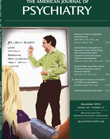In This Issue

The Editors have each chosen one outstanding Journal article published in 2010, and on p. 1431 they describe the importance of these works.
Selection of an effective treatment for depression is a goal of personalized medicine. According to Simon and Perlis (p. Original article: 1445), there is no evidence that an antidepressant that has previously been effective for a patient or for family members will be effective in the current episode. Conversely, failure to respond to one drug in a class, such as selective serotonin reuptake inhibitors, does not predict poor response to other drugs in the class. There is modest evidence that personality disorder predicts better response to medication and that traumatic life events predict better response to psychotherapy. Patient preference itself is also a moderate predictor. Some evidence suggests that borderline personality disorder or attachment difficulty responds better to cognitive therapy than to interpersonal therapy. No biomarker yet predicts response. Simon and Perlis suggest that early monitoring of therapeutic response and preparation of patients to switch to alternative therapies if necessary is the best clinical practice.
Deep brain stimulation for treatment-resistant depression is a promising new experimental treatment. Holtzheimer and Mayberg (p. Original article: 1437) present a case study of a patient who received deep brain stimulation targeted to the subcallosal cingulate. The patient experienced a gradual improvement over 24 weeks, but his course included a period of partial relapse at 16 weeks. Holtzheimer and Mayberg point out that the intervention has not been validated by placebo-controlled trials and therefore should not be considered for clinical use. High placebo response rates have been found for similarly invasive treatment of resistant Parkinson's disease.
A Shift Away From Psychotherapy
The percentage of Americans using psychotherapy remained stable between 1998 and 2007, but as outpatient mental health treatment expanded to more people, the proportion receiving psychotherapy shrank from 16% to 11%. Two large surveys of U.S. households also revealed that patients who received psychotherapy made fewer visits over time. Olfson and Marcus (CME, p. Original article: 1456) report that the rate of combined psychotherapy-drug treatment also fell, while the proportion of patients treated with psycho-tropic drugs only rose from 44% to 57%. In his editorial (p. Original article: 1419), Benjamin Druss examines forces underlying the trend away from psychotherapy and notes new laws and initiatives that could counter it.
Children who are inhibited can be identified in preschool and are at risk for anxiety disorders later in childhood. Rapee et al. (CME, p. Original article: 1518) developed a six-session parent group intervention that consists of education in parenting skills and cognitive restructuring to diminish overprotective behaviors toward the child. Positive effects, assessed as decreased numbers and severity of anxiety disorders and symptoms, were then observed in the children several years later in midchildhood. Dr. Bruce Cuth-bert notes in his editorial (p. Original article: 1428) that the treatment effects were relatively modest at 1 year but were more robust at 24 and 36 months.
Adult Outcomes for Children Verbally Abused by Peers
Ratings of depressive and anxiety symptoms, dissociation, and epilepsy-like phenomena were higher for young adults subjected to verbal abuse by their peers between ages 4 and 18 than for those who received minimal verbal abuse. Males assessed by Teicher et al. (CME, p. Original article: 1464) reported more verbal abuse than females, and exposure during the middle school years appeared to be the most consequential. Verbal abuse by peers was also related to white matter abnormalities in the brain. The editorial by Frank Putnam (p. Original article: 1422) describes commonalities among various forms of childhood adversity, which might help in finding treatments.



